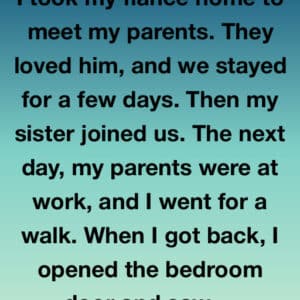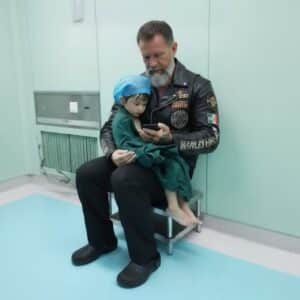The letter showed up on a Tuesday, tucked between a utilities bill and a supermarket flyer.
It was handwritten, addressed to both my wife and me, and from the first line I knew what it was about.
Her name was Lila. She wrote that she’d just turned twenty. That she’d spent two years picking up this letter, putting it down, writing, deleting, and finally deciding to send it after her adoptive mom showed her an old journal. In it, ten-year-old Lila had written: I wonder if my birth mom ever thinks about me.
I wasn’t shocked. Before we got married, Teresa had told me about the baby she’d given up when she was eighteen. One night, sitting in my old car outside a diner, she’d said it like she was confessing a crime.
“I was at a shelter,” she’d whispered. “I had nothing. I thought giving her up was the only way to give her something.”
What surprised me wasn’t that the past had found us.
It was the tone of the letter.
Lila wasn’t demanding answers or spitting anger. Her words were careful, respectful, almost apologetic, like she was afraid she might be intruding on our lives simply by existing. She said she didn’t want to disrupt anything. That she was grateful for the life she’d had. That she just wanted Teresa to know she was alive, safe, and okay.
Teresa sat at the kitchen table with that letter in her hands for a long time. The overhead light buzzed softly. I watched tears slide down her cheeks, one after another, silent and steady. She’s not someone who cries easily; in our ten years of marriage, I’d seen it maybe twice.
I didn’t give her a speech. I just rested my hand over hers, feeling the paper crinkle beneath our fingers.
“She might not want anything more than this,” Teresa finally whispered. “Maybe she just needed to say ‘Here I am’ and let me know I didn’t… lose her completely.”
But I saw it in her eyes. A door she’d tried to bolt shut at eighteen had just shifted open, and no amount of pretending was going to close it again.
We waited a few days to respond. Teresa insisted on writing back herself. I offered to help, but she shook her head.
“If I overthink it, I’ll never send it,” she said. “It has to be my voice.”
She spent an entire Saturday at the table, surrounded by crumpled drafts and half-finished sentences. She wrote and rewrote until the edges of the paper went soft. In the final version, she told Lila the truth: that she’d been young and terrified. That giving her up wasn’t about rejection, but a desperate attempt at protection. She thanked Lila’s adoptive parents for loving her. And she said, gently, that she was open to whatever Lila wanted—letters, calls, nothing at all. The door, at least on our side, was open.
Two weeks later, another letter came.
This one was longer. Lila told us about the small northern town where she grew up, her love of music, her psychology studies. She mentioned her adoptive mom, Karen, with warmth. She didn’t ask for money, apologies, or explanations. She simply said knowing Teresa was alive and okay gave her a kind of peace she hadn’t known she’d been missing.
That alone could’ve been the whole story.
But something subtle shifted in my wife after that.
She started humming in the kitchen again. She rummaged around in the attic one evening and came downstairs holding her old guitar, the one that hadn’t seen daylight in years.
“I used to play all the time,” she said, almost to herself.
It was like reconnecting with Lila had reconnected her with parts of herself she’d buried alongside that memory.
The letters continued. Once a month. Then twice. They shared little things—favorite books, embarrassing childhood stories, inside jokes that somehow formed even across distance and decades.
One evening, Teresa looked up from a new letter and asked, a little shyly, “Do you think it would be too much if I invited her here? Just for a weekend?”
“She’s part of you,” I said. “So she’s part of us. If you’re ready, then yes. Invite her.”
When Lila stepped off the bus and walked toward us, I felt something twist in my chest.
She was quieter than I’d imagined. Guarded, polite. She hugged Teresa with that hesitant stiffness people have when they’re not sure if they’re allowed to fall apart. But she had Teresa’s eyes—that warm, deep brown that makes you feel like you’re in on some gentle secret.
She handed us a plant in a ceramic pot. “I read houseplants are good for, uh, housewarming,” she said with an awkward little laugh. “Even if the house is already warm.”
That weekend unfolded better than I could’ve hoped. We sat on the porch drinking iced tea while cicadas buzzed in the heat. We talked about her college classes, her favorite bands, and the way she’d always felt different without knowing exactly why. Teresa told stories about sneaking out as a teenager to play open-mic nights.
On Sunday evening, as she stood by the car, Lila glanced back at the house.
“This might sound weird,” she said, “but this place feels… familiar. Like somewhere I’ve visited in a dream.”
After she left, the house felt bigger and a little too quiet. Teresa lingered near the plant more than usual, checking its soil, adjusting its place on the windowsill like it was something fragile and precious.
Then came the first twist.
Three months after that visit, my phone rang. It was a number I didn’t recognize. When I answered, a woman introduced herself.
“This is Karen,” she said. “Lila’s mom.”
Her voice was steady, but there was a tiredness underneath it. “I thought you should know… she’s been struggling more than she lets on.”
She told us about Lila’s breakup. About her leaving grad school halfway through. About therapy sessions for anxiety and depression that had started long before that first letter was ever sent.
“She didn’t want to worry you,” Karen said. “She really wanted her birth mom to see her as strong.”
Teresa’s face crumpled when I told her. “She shouldn’t have to be strong for me,” she said. “I’m supposed to be strong for her.”
She called Lila that evening. At first, Lila tried to brush it off.
“It’s not a big deal,” she said. “I’m managing.”
But Teresa didn’t let it slide. “I don’t care how ‘together’ you think you have to look,” she told her gently. “You’re my kid. I’m allowed to worry.”
That weekend, Teresa took the train up north. She stayed at a cheap motel and spent her days with Lila—walking, cooking simple meals, sitting on a park bench sharing stories neither of them had said out loud before.
When she came home, she looked exhausted, but there was something softer in her expression.
“She’s hurting,” Teresa said quietly. “But she’s also healing. She just needed someone to sit in the dark with her without trying to flip on the lights right away.”
Over the next year, Lila visited more often. We made up the spare room for her. Slowly, she stopped feeling like a guest and more like a piece of furniture that had finally been returned to its rightful place.
She helped me fix the loose porch steps, disappearing under the boards with a drill and more confidence than I expected. She baked cookies with Teresa, the two of them dancing badly to old songs in the kitchen. On rainy days, we played board games, accusing each other of cheating and laughing until our sides hurt.
Then, one quiet night, she sat us down in the living room.
“There’s something I should tell you,” she said, fingers twisting the hem of her sleeve.
I braced myself. Pregnancy? Moving across the world? Dropping out again?
“My adoptive dad…” She took a breath. “He wasn’t… kind. He didn’t hit me, but when he drank, he talked like he wished I’d stayed where I came from.”
Her voice got smaller.
“‘You were unwanted.’ ‘We saved you.’ ‘You should be grateful we picked you.’ Stuff like that.”
She stared at her hands.
“It took me years to understand those words weren’t true. But they stuck anyway.”
Teresa moved immediately. She sat beside Lila and pulled her into a hug that didn’t demand anything in return.
“You were never unwanted,” she said, voice shaking. “I was a terrified teenager in a shelter. I thought love meant stepping aside. I thought… giving you up meant giving you a chance. I just didn’t know how much it would cost both of us.”
Lila nodded against her shoulder, tears slipping free. “I did have good years,” she whispered. “Karen is… incredible. But I needed you to know the whole picture. Because shame feeds on secrets. And I’m tired of feeding it.”
That conversation cracked open another layer.
Lila started sharing more—the panic attacks she’d hidden, the way every birthday felt half-finished, the strange guilt she carried for existing in two families like she was cheating on both.
In return, Teresa shared things I’d never heard in that much detail. About going into labor alone. About the nurse who held her hand when her own mother refused to visit. About sobbing in the shelter’s mildewed shower afterward, wondering if she’d just made the biggest mistake of her life and not knowing how to undo it.
With every story laid on the table, something heavy in the room lifted. Not gone, but lighter.
Then life threw us one more curveball.
One summer afternoon, I got a message from a woman named Lena. She said she was a nurse at a nearby clinic and had met Lila during a mental health workshop. They’d gotten to talking and, somehow, my name had come up.
“I think,” she wrote, “that I knew your father.”
That stopped me. My dad died when I was sixteen. He’d been a quiet guy, worked long hours at a repair shop, and came home smelling like oil and metal. We didn’t talk about him much; grief had made the silence easier than picking at old wounds.
Lena and I spoke on the phone.
“Your dad volunteered at the shelter for young moms,” she said. “He fixed things. Washing machines, heaters. He brought hot meals sometimes. I was a junior nurse then.”
I remember gripping the edge of the countertop.
She sent me a photo she’d kept. In it, my father was younger, hair thicker, smile wider. He was holding a newborn wrapped in a pink blanket, eyes crinkled the way mine do when I really laugh.
Beneath the photo, Lena had written: Teresa. 18. First-time mom. Shelter, January 1999.
“It was your wife,” Lena said. “Your dad adored that girl. Sat in the hallway the night she was in labor. Said no one should be alone if he could help it.”
I showed Teresa the photo that night. She stared at it like she’d been hit by a wave.
“I never knew his name,” she whispered. “But I remember his face. He brought me a hot meal and fixed the dryer the night before I delivered. I always thought he was just… an angel passing through.”
We both just stood there for a while, each holding our own piece of the same puzzle.
My father had been there for her when she was eighteen and terrified.
Years later, I’d married her without knowing. And together, we’d opened our door for the daughter she thought she’d lost.
Life doesn’t just come full circle. Sometimes it loops and braids and ties what looks like loose ends into something you couldn’t see forming.
A few months after that revelation, we celebrated Lila’s twenty-third birthday in our backyard.
Teresa made her favorite carrot cake with extra cream cheese frosting. I grilled burgers while Lila sat on the steps, guitar in her lap, playing half-finished songs she’d written herself.
At one point in the evening, after the candles were blown out and the plates were cluttered with crumbs, she looked around at us—at Teresa fussing with the cake knife, at me flipping another burger I didn’t really need to cook, at the silly string someone had sprayed onto the hedge—and sighed, a deep, contented sound.
“I never thought I’d have this,” she said softly. “A place that feels like home. People who know all the messy bits and don’t run.”
I looked at her—this young woman who had entered our lives folded between two pieces of paper—and felt something settle inside me.
Here’s what I’ve learned:
Family isn’t just the people whose faces show up on your family tree. It’s the ones who show up at the train station with an overnight bag when you’re not okay. It’s the nurse who hugs a scared teenager. The man who fixes a washing machine at a shelter at nine at night because he believes small kindnesses matter. It’s the daughter who risks rejection by writing a letter. The mother who answers it. The husband who decides that someone else’s history is now his, too.
Maybe you’re the one who had to sign papers you never wanted to sign.
Maybe you’re the one who grew up feeling like a question nobody wanted to answer.
Maybe there’s a letter sitting half-finished in a drawer somewhere, and you’re scared that sending it will blow your world apart.
This is what our story taught me: not everything lost is gone forever. Some things are just waiting for the right door to open, the right time, the right courage.
Sometimes it’s a letter arriving on an ordinary Tuesday.
Sometimes it’s a photo from a stranger, proving that someone you loved quietly held up someone you hadn’t met yet.
And sometimes, it’s a birthday in a backyard, with carrot cake crumbs on the table and a girl with your wife’s eyes saying, “I never thought I’d have this.”
If this story feels close to your own, I hope it reminds you of this: it is never too late for a new chapter. Never too late to write, to answer, to forgive, to be found, or to be family—on purpose, this time.





